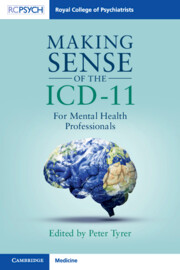Book contents
- Making Sense of the ICD-11
- Making Sense of the ICD-11
- Copyright page
- Contents
- Contributors
- Introduction
- Chapter 1 Development and Innovation in the ICD-11 Chapter on Mental, Behavioural and Neurodevelopmental Disorders
- Chapter 2 ICD-11 + DSM-5 = A Diagnostic Babel
- Chapter 3 Schizophrenia or Other Primary Psychotic Disorders
- Chapter 4 Mood Disorders
- Chapter 5 Disorders Specifically Associated with Stress
- Chapter 6 Disorders Due to Substance Use
- Chapter 7 Child and Adolescent Psychiatric Disorders
- Chapter 8 Anxiety and Fear-Related Disorders and Obsessive–Compulsive and Related Disorders
- Chapter 9 Personality Disorders
- Chapter 10 Disorders of Intellectual Development
- Chapter 11 Eating Disorders
- Chapter 12 Mental Health Classifications in Primary Care
- Index
- References
Introduction
A Guide to This Book
Published online by Cambridge University Press: 13 October 2023
- Making Sense of the ICD-11
- Making Sense of the ICD-11
- Copyright page
- Contents
- Contributors
- Introduction
- Chapter 1 Development and Innovation in the ICD-11 Chapter on Mental, Behavioural and Neurodevelopmental Disorders
- Chapter 2 ICD-11 + DSM-5 = A Diagnostic Babel
- Chapter 3 Schizophrenia or Other Primary Psychotic Disorders
- Chapter 4 Mood Disorders
- Chapter 5 Disorders Specifically Associated with Stress
- Chapter 6 Disorders Due to Substance Use
- Chapter 7 Child and Adolescent Psychiatric Disorders
- Chapter 8 Anxiety and Fear-Related Disorders and Obsessive–Compulsive and Related Disorders
- Chapter 9 Personality Disorders
- Chapter 10 Disorders of Intellectual Development
- Chapter 11 Eating Disorders
- Chapter 12 Mental Health Classifications in Primary Care
- Index
- References
Summary
Psychiatric classification is like growing old – a subject often avoided but recognized as inevitable. Whether you use a standard classification such as ICD-11 or a personal one such as ‘people-I-feel-confident-in-treating’ or ‘people-I-prefer to avoid’, it is impossible to avoid some sort of order in a subject which can present in a myriad of ways. Carl Linnaeus, not exactly a modest man, often liked to quote his prime achievement, ‘God created the world, Linnaeus organized it’. His Systema Naturae, published in 1735, introduced the ‘definitive’ classification of all living organisms, organized into species, genera, classes, and orders. This classification certainly revolutionized biology and the Linnaean system continues to remain supreme, and in psychiatry we would like to aspire to a similar pinnacle of achievement if we were able to create a classification of equal standing. But please pause a minute. The Linnaean system is not definitive. Whole groups of organisms are now being refined by DNA technology and a new classification is likely to be on its way to replace or enhance it. All classifications are ephemeral.
- Type
- Chapter
- Information
- Making Sense of the ICD-11For Mental Health Professionals, pp. 1 - 4Publisher: Cambridge University PressPrint publication year: 2023

